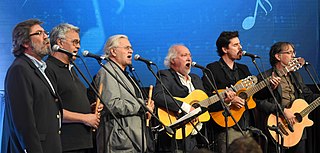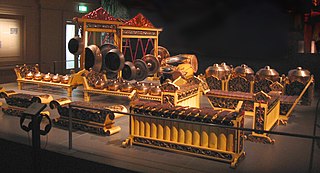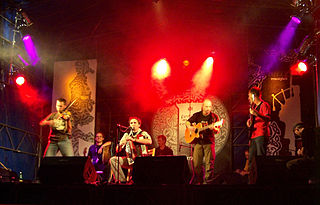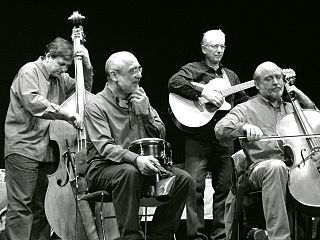External links
- "Página Oficial da Brigada Victor Jara - A história". Brigada Victor Jara. Archived from the original on 2005-12-19. Retrieved 2005-12-28. offline 2013-02-24
Brigada Víctor Jara | |
|---|---|
| Origin | Coimbra, Portugal |
| Genres | Folk |
| Years active | 1975–present |
| Website | www |
The Brigada Víctor Jara (lit. 'Víctor Jara Brigade') is a Portuguese folk band, with a career of more than 30 years and among the most influential Portuguese folk acts.[ citation needed ]
The band was formed in 1975, by a group of young people from Coimbra that was participating in one of the massive literacy campaigns carried out by the provisional governments that administered Portugal in the years after the Carnation Revolution of 1974. The group was working in the inland region of Beira Baixa and often played Chilean and Portuguese folk and political songs for the people. After discovering the cultural and musical traditions of the region the group formed the band and named it after Víctor Jara, a Chilean socialist and folk singer-songwriter, killed after the Chilean coup of 1973 carried out by General Augusto Pinochet.

Víctor Lidio Jara Martínez was a Chilean teacher, theater director, poet, singer-songwriter and Communist political activist. He developed Chilean theater by directing a broad array of works, ranging from locally produced plays to world classics, as well as the experimental work of playwrights such as Ann Jellicoe. He also played a pivotal role among neo-folkloric musicians who established the Nueva canción chilena movement. This led to an uprising of new sounds in popular music during the administration of President Salvador Allende.

Portuguese music includes many different styles and genres, as a result of its history. These can be broadly divided into classical music, traditional/folk music and popular music and all of them have produced internationally successful acts, with the country seeing a recent expansion in musical styles, especially in popular music.

La Bottine Souriante is a folk band from Canada. The band specializes in traditional French Canadian folk music, often with a modern twist.

Quilapayún are a folk music group from Chile and among the longest lasting and most influential ambassadors of the Nueva Canción Chilena movement and genre. Formed during the mid-1960s, the group became inseparable with the revolution that occurred in the popular music of the country under the Popular Unity Government of Salvador Allende.

The viola caipira, often simply viola or brazilian viola, is a Brazilian ten-string guitar with five courses of strings arranged in pairs. It was introduced in the state of São Paulo, where it is widely played as the basis for the música caipira, a type of folk-country music originating in the caipira country of south-central Brazil.

Vamp is a folk-rock band from Haugesund, Norway with founding members Øyvind Staveland, Calle Øyvind Apeland, Paul Hansen, Bjørn Berge, Odin Staveland and Tore Jamne. The band's musical profile is a mix of Norwegian traditional folk music combined with rock.

A folk instrument is a musical instrument that developed among common people and usually does not have a known inventor. It can be made from wood, metal or other material. Such an instrument is played in performances of folk music.
The Wyrd Sisters are a Canadian folk music group formed in 1990 in Winnipeg by founding members Kim Baryluk, Nancy Reinhold and Kim Segal. The band chose the name "the Wyrd Sisters" to represent and reclaim the ancient pre-Christian triple goddess, also known as Weird, Wurd, Urd, Urth and The Fates. Presenting initially as a trio, the group later grew to include a full band.

Rawlins Cross is a Celtic band that formed in 1988 in Atlantic Canada. With members from Newfoundland, Nova Scotia, Prince Edward Island and Ontario, the band took its name from an intersection in St. John's, Newfoundland.

40 Days is the debut full-length album from Canadian folk trio The Wailin' Jennys. The lineup of the group at the time was Ruth Moody, Nicky Mehta, and Cara Luft. This was the last recording to feature Luft, who left the group the following year.
Italian music terminology consists of words and phrases used in the discussion of the music of Italy. Some Italian music terms are derived from the common Italian language. Others come from Spanish, or Neapolitan, Sicilian, Sardinian or other regional languages of Italy. The terms listed here describe a genre, song form, dance, instrument, style, quality of music, technique or other important aspect of Italian music.
The Iron Horse was a Scottish Celtic music band formed in 1990. During the 1990s the band, along with others, broadened Celtic music from its traditional roots to the wider range of music now encompassed within the Celtic music genre. From slow airs and ballads to driving instrumentals, they wrote and performed a broad spectrum of Scottish folk music. Though the band split up in 2001, due to contractual recording obligations, they reunited briefly in 2004 to record a final album.
Gerd Domhardt was a German composer.

Scythian is a Celtic rock/Americana band based in the DC Metro Area that formed in 2002. The band's name, according to the members of Scythian, means "[a] bunch of pre-Mesopotamian barbarians who did not use forks or phonics," which they chose to describe a varying sound that encompasses everything from traditional jigs and reels to contemporary covers. The band was named after Ukrainian nomads, Scythians, due to the Ukrainian ancestry of Alexander and Danylo Fedoryka.

Beltaine is a Polish folk band.

Kaláka is a folk music group formed in Budapest, Hungary on November 26, 1969. The founding members are Dániel Gryllus, Vilmos Gryllus, István Mikó and Balázs Radványi. Later Mikó was replaced by Péter Dabasi who in turn was replaced by Péter Huzella and later by Gábor Becze. Tamás Kobzos Kiss was also a member of the band for a short time. They have been in their current lineup since 1996.

Luís Gil Bettencourt is a Portuguese-American musician, songwriter, and music producer.

Francisco, el Hombre is a Brazilian rock, Mexican, Brazilian and Latin American music band formed in 2013 by Mexican-born Brazilian brothers Sebastián and Mateo Piracés-Ugarte in the city of Campinas, São Paulo.
Entrama is a Chilean music group that since its inception in 1997 develops instrumental music, fusing styles such as Latin American music of folkloric origin, with jazz and classical music, mainly using compositional techniques derived from the latter. It has also been catalogued as world music. According to the specialized critics they have been called as popular musicians for refined and demanding listeners.
The Misa Sine Nomine is a 1977 musical work for narrator, mixed choirs with up to 36 voices, organ, and percussion by Leon Schidlowsky. It was composed in memory of Chilean folk singer and human rights activist Víctor Jara. The work is a setting of parts of the mass ordinary juxtaposed with Biblical passages in Hebrew, and texts in other languages by various contemporary authors, including by the composer himself. The composition is in eleven movements and utilizes different groupings of performers in each. The score uses graphic notation. The movements, which can be performed separately, are meant to be accompanied by visual projections. It was first performed in Hamburg in 1980.